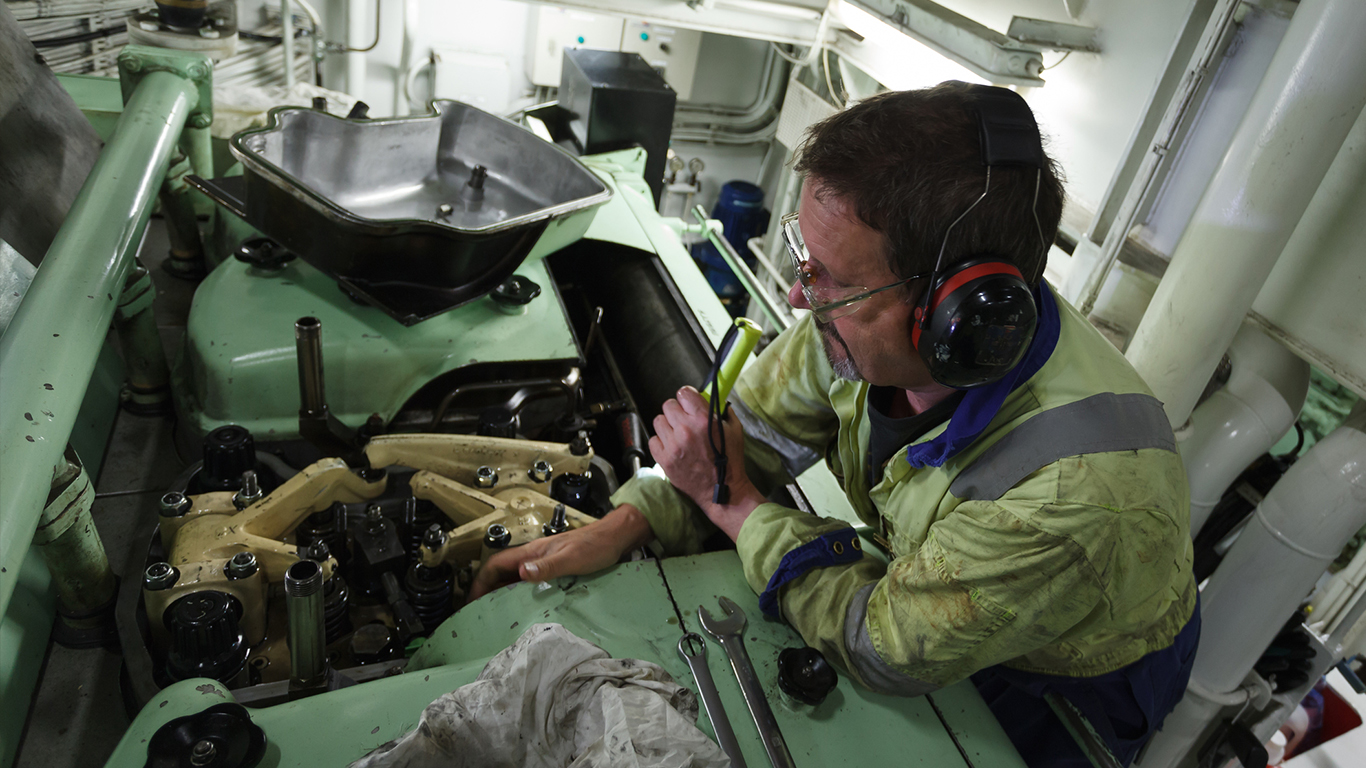Special Report
Highest Paying Jobs You Can Get Without a College Degree

Published:
Last Updated:

The college enrollment rate has fallen in recent years, and many high school graduates are looking for lucrative opportunities that do not require four years of college tuition. While the typical job in the U.S. that requires just a high school degree pays roughly $35,000 less than professions that require a bachelor’s degree, there are a number of high paying jobs in the United States that favor experience, training, and skill over a college education.
In many of these positions — law enforcement and other supervisory roles in non-academic fields, for example — years of experience often trump formal academic education. Similarly, on-the-job training in some of these positions, such as repairs and operations of specialized equipment, is often more beneficial than anything learned in a classroom setting. Also, while not requiring a college degree, some of these jobs require licenses or other specific credentials and certification.
To identify the highest paying jobs that do not require a college degree, 24/7 Wall St. reviewed median annual wage estimates for all occupations with data from the Bureau of Labor Statistics. These 50 positions typically have no formal education requirement beyond a high school diploma, and the typical employee at the lowest-paying of these earns $56,790. By comparison, the median annual wage across all occupations in the U.S. is $37,040.
Click here to see the highest paying jobs you can get without a college degree.
Click here to see our detailed findings and methodology.

50. Real estate brokers
> Median annual wage: $56,790
> Typical on-the-job training needed: None
> Total employment: 40,850
> Employment growth projection (2014-2024): 1.8%
While real estate brokers do not need a college degree, most states require candidates to pass a licensing exam. Brokers earn most of their income from sales commissions and, therefore, their earnings vary by individual skill, property values, and economic conditions. The top-paying states for real estate brokers are New Hampshire, Hawaii, and New York, where home values tend to be well above the national median.
[in-text-ad]

49. Property, real estate, and community association managers
> Median annual wage: $57,040
> Typical on-the-job training needed: None
> Total employment: 180,290
> Employment growth projection (2014-2024): 8.1%
Professionally managed community services for apartment buildings, condominiums, and cooperatives are growing, according to the Labor Department. Demand for workers is projected to grow 8.1% through 2024, approximately as fast as the average for all occupations. Fewer than half of all Americans holding this occupation have a bachelor’s degree.

48. Sales representatives, wholesale and manufacturing, except technical and scientific products
> Median annual wage: $57,140
> Typical on-the-job training needed: Moderate-term on-the-job training
> Total employment: 1,404,050
> Employment growth projection (2014-2024): 6.4%
The typical wholesale and manufacturing sales representative earns $57,140 a year, roughly $30,000 more than the median annual wage for all sales workers. While the position usually requires just a high school diploma, nearly 50% of all such workers have a bachelor’s degree, one of the largest shares of any job without a college requirement.

47. First-line supervisors of transportation and material-moving machine and vehicle operators
> Median annual wage: $57,270
> Typical on-the-job training needed: None
> Total employment: 202,760
> Employment growth projection (2014-2024): 2.9%
Supervisors of material-moving machine operators can have a number of job titles, including fleet manager, dock supervisor, and driver manager. Their primary responsibilities include directing workers to meet operation goals and enforcing safety regulations. The median wage in the profession is $57,270, well above the $37,040 median among all occupations.
[in-text-ad-2]

46. Railroad conductors and yardmasters
> Median annual wage: $57,480
> Typical on-the-job training needed: Moderate-term on-the-job training
> Total employment: 42,880
> Employment growth projection (2014-2024): -1.9%
Railroad conductors travel on freight and passenger trains and are responsible for coordinating the loading and unloading of cargo and the safe travel of riders. Yardmasters perform a similar job from within the rail yard. Such workers have the potential to earn large salaries with little more than a high school diploma and a few months of on-the-job training.

45. Locomotive engineers
> Median annual wage: $57,670
> Typical on-the-job training needed: Moderate-term on-the-job training
> Total employment: 39,900
> Employment growth projection (2014-2024): -2.3%
Locomotive engineers drive freight or passenger trains from station to station. Just 11.6% of locomotive engineers have at least a bachelor’s degree. The typical wage for the position is $57,670 a year, far more than the $37,110 median annual wage for jobs requiring just a high school diploma.
[in-text-ad]

44. First-line supervisors of production and operating workers
> Median annual wage: $57,780
> Typical on-the-job training needed: None
> Total employment: 610,480
> Employment growth projection (2014-2024): -3.1%
Most production worker supervisors do not have a college education and the typical salary in the field is more than $20,000 higher than the $37,040 median salary across all occupations. However, in keeping with the overall decline in U.S. manufacturing, demand for such workers is projected to fall by 3.1% by 2024.

43. Postal service mail carriers
> Median annual wage: $58,110
> Typical on-the-job training needed: Short-term on-the-job training
> Total employment: 328,950
> Employment growth projection (2014-2024): -26.2%
Most postal workers do not have a college degree and make at least $58,000 annually. However, as more Americans use email or automated bill pay, the need for physical mail carriers has been drastically reduced. The number of postal service mail carriers is projected to fall by 26.2% in the decade ending 2024.

42. Locomotive firers
> Median annual wage: $58,230
> Typical on-the-job training needed: Moderate-term on-the-job training
> Total employment: 1,210
> Employment growth projection (2014-2024): -69.9%
The median annual salary among locomotive firers, or assistant passenger train engineers, is $58,230, well above many jobs that have a much higher educational barrier to entry. Most locomotive firers have not completed college. However, such jobs are becoming increasingly scarce as demand for workers in the field is projected to drop by 70% by 2024, the steepest decline of any job in the U.S.
[in-text-ad-2]

41. Fire inspectors and investigators
> Median annual wage: $58,440
> Typical on-the-job training needed: Moderate-term on-the-job training
> Total employment: 11,910
> Employment growth projection (2014-2024): 5.5%
While the typical fire inspection or investigation position does not require a college degree, many states require such workers to pass a certification exam assessing standards established by the National Fire Protection Association and to undergo a months-long training program at fire or police academies. Most fire inspectors make over $58,000 a year.

40. Construction and building inspectors
> Median annual wage: $58,480
> Typical on-the-job training needed: Moderate-term on-the-job training
> Total employment: 94,960
> Employment growth projection (2014-2024): 8.0%
Construction and building inspectors earn well above the median salary for occupations that do not require a college degree. In some states, inspectors need certification. The BLS projects the strongest demand for such workers to be in the public sector architecture and engineering firms.
[in-text-ad]

39. Electrical and electronics installers and repairers, transportation equipment
> Median annual wage: $59,280
> Typical on-the-job training needed: Long-term on-the-job training
> Total employment: 13,960
> Employment growth projection (2014-2024): 4.4%
While electrical and electronics installation and repair does not require a bachelor’s degree, most employers prefer that candidates take some college-level electronics courses prior to employment. Approximately 37% of such workers have attended some college without obtaining a degree, one of the largest shares of any profession.

38. Stationary engineers and boiler operators
> Median annual wage: $59,400
> Typical on-the-job training needed: Long-term on-the-job training
> Total employment: 33,720
> Employment growth projection (2014-2024): 1.4%
About 77% of stationary engineers and boiler operators have only a high school diploma or less. The occupation’s median salary is $59,400, well above many jobs with much higher educational barriers to entry. Despite minimal educational requirements, workers in the field must undergo one or two years of on-the-job training.

37. Police and sheriff’s patrol officers
> Median annual wage: $59,680
> Typical on-the-job training needed: Moderate-term on-the-job training
> Total employment: 657,690
> Employment growth projection (2014-2024): 5.0%
Only about 38% of all police officers in the U.S. have a bachelor’s degree. While a college education is not required for the job, most police officers are required to attend a training academy. The relatively high median salary of $59,680 is partially necessitated by the dangerous conditions and situations many police officers face on a daily basis.
[in-text-ad-2]

36. Chemical plant and system operators
> Median annual wage: $59,920
> Typical on-the-job training needed: Long-term on-the-job training
> Total employment: 33,300
> Employment growth projection (2014-2024): -9.2%
In lieu of a bachelor’s degree, most chemical plant and system operator positions require long-term on-the-job training. The typical chemical plant operator earns $59,920 a year, far more than the $37,110 median wage for all U.S. jobs requiring just a high school degree.

35. Aircraft mechanics and service technicians
> Median annual wage: $60,170
> Typical on-the-job training needed: None
> Total employment: 128,570
> Employment growth projection (2014-2024): 1.3%
Most aircraft mechanics and service technicians find employment in the field after receiving related training in the military or attending a technician school approved by the Federal Aviation Administration, rather than obtaining a college degree. The majority of Americans in the job earn over $60,000 a year.
[in-text-ad]

34. Rail transportation workers, all other
> Median annual wage: $60,420
> Typical on-the-job training needed: Moderate-term on-the-job training
> Total employment: 4,470
> Employment growth projection (2014-2024): 1.3%
A relatively small field, the rail transportation workers, all other classification includes such jobs as transfer table operator and railway equipment operator. The job is one of only 35 in the U.S. with a median salary over $60,000 that does not require a college degree.

33. Gas compressor and gas pumping station operators
> Median annual wage: $60,470
> Typical on-the-job training needed: Moderate-term on-the-job training
> Total employment: 3,890
> Employment growth projection (2014-2024): 3.4%
More than three-quarters of gas compressor and gas pumping station operators have only a high school diploma or less and most earn over $60,000 a year. High salaries are likely partially the result of the dangerous conditions most people in the job face on a daily basis.

32. First-line supervisors of correctional officers
> Median annual wage: $60,560
> Typical on-the-job training needed: Moderate-term on-the-job training
> Total employment: 43,230
> Employment growth projection (2014-2024): 3.1%
Responsible for supervising jailors and correctional officers, correctional officers and lieutenants primarily work in prisons and jails. While little formal education is needed for the relatively high annual wage, for most in the field, the job often requires working with unpleasant people, often in conflict situations.
[in-text-ad-2]

31. Makeup artists, theatrical and performance
> Median annual wage: $60,970
> Typical on-the-job training needed: None
> Total employment: 3,600
> Employment growth projection (2014-2024): 19.2%
The typical makeup artist working on a theatrical production earns $60,970 a year, roughly $10,000 less than the $71,530 median annual wage for all jobs that require a bachelor’s degree. More than 22% of theatrical makeup artists did not graduate high school, one of the largest shares of any profession.

30. Artists and related workers, all other
> Median annual wage: $61,360
> Typical on-the-job training needed: Long-term on-the-job training
> Total employment: 7,010
> Employment growth projection (2014-2024): 0.4%
The artists and related workers, all other classification includes such jobs as calligraphers and tattoo artists. While there is no formal educational requirement, more than half of all Americans in these occupations have at least a bachelor’s degree. The demand for such jobs is projected to remain relatively stable through 2024.
[in-text-ad]

29. Boilermakers
> Median annual wage: $62,060
> Typical on-the-job training needed: Apprenticeship
> Total employment: 16,660
> Employment growth projection (2014-2024): 8.7%
Boilermaking is a complex, skilled discipline, and most four-year colleges do not offer a course of study in the field. While the typical boilermaking job does not require a bachelor’s degree, most boilermakers first learn the trade through an apprenticeship program that lasts four to five years. The typical boilermaker receives paid on-the-job training as an apprentice.

28. First-line supervisors of construction trades and extraction workers
> Median annual wage: $62,980
> Typical on-the-job training needed: None
> Total employment: 538,220
> Employment growth projection (2014-2024): 10.0%
Construction and extraction are often dangerous industries, and their supervision is important. While most first-line construction and extraction supervision roles do not require a bachelor’s degree, the typical position requires candidates to have a minimum of five years experience. The typical first-line supervisor earns $62,980 a year, far more than the $37,110 median for all jobs requiring a high school diploma.

27. Insurance appraisers, auto damage
> Median annual wage: $63,510
> Typical on-the-job training needed: Moderate-term on-the-job training
> Total employment: 15,130
> Employment growth projection (2014-2024): -1.2%
Insurance appraisers inspect vehicles damaged in a crash or accident and develop an estimate for the cost of repairs to be used by the insurance adjuster. While auto damage appraisers are not required to have a bachelor’s degree, employers often prefer candidates who have some background in college-level accounting, engineering, and legal coursework. Nearly 50% of people in the profession have a bachelor’s degree.

26. First-line supervisors of mechanics, installers, and repairers
> Median annual wage: $63,540
> Typical on-the-job training needed: None
> Total employment: 453,330
> Employment growth projection (2014-2024): 5.4%
While most first-line supervisors of mechanics, installers, and repairers are not required to have a college degree, the position typically requires one to five years of related experience. The typical supervisor earns $63,540 a year, far more than the $37,110 median for all jobs requiring a high school diploma.
[in-text-ad]

25. Claims adjusters, examiners, and investigators
> Median annual wage: $63,680
> Typical on-the-job training needed: Long-term on-the-job training
> Total employment: 274,420
> Employment growth projection (2014-2024): 3.3%
Claims adjusters, examiners, and investigators are typically employed by insurance companies, and are tasked with assessing property damage, creating estimates, interviewing claimants, and negotiating settlements. The job typically requires a high school diploma and one or two years of on-the-job training. Most Americans working in the profession earn over $63,000 a year.

24. Subway and streetcar operators
> Median annual wage: $64,680
> Typical on-the-job training needed: Moderate-term on-the-job training
> Total employment: 12,350
> Employment growth projection (2014-2024): 4.7%
In lieu of a bachelor’s degree, subway and streetcar operators undergo moderate on-the-job training. More than 50% of subway and streetcar operators work in the New York and San Francisco metro areas, which together have an annual ridership of approximately 1.89 billion.

23. Signal and track switch repairers
> Median annual wage: $65,350
> Typical on-the-job training needed: Moderate-term on-the-job training
> Total employment: 8,680
> Employment growth projection (2014-2024): -0.1%
While signal and track switch repairers do not need a college degree, the job requires substantial on-the-job training. Signal and track switch repairers earn the most in New York, where much of the subway system’s signal equipment is decades old and in constant need of service.
[in-text-ad-2]

22. Farmers, ranchers, and other agricultural managers
> Median annual wage: $66,360
> Typical on-the-job training needed: None
> Total employment: 4,560
> Employment growth projection (2014-2024): -1.9%
Most farming, ranching, and agricultural management positions require at least five years of previous work experience, which some candidates may have after growing up on a family farm. As farm management becomes more complex, however, employers have increasingly required agricultural managers to have a college degree in agriculture or a related field.

21. Transit and railroad police
> Median annual wage: $66,610
> Typical on-the-job training needed: Moderate-term on-the-job training
> Total employment: 4,810
> Employment growth projection (2014-2024): 3.5%
While most transit and railroad police positions do not require a college degree, candidates must undergo some on-the-job training to be fully qualified. Approximately 37% of transit and railroad police work is in the New York metro area, where subway crime rose roughly 11% in 2015.

20. Petroleum pump system operators, refinery operators, and gaugers
> Median annual wage: $67,400
> Typical on-the-job training needed: Long-term on-the-job training
> Total employment: 41,630
> Employment growth projection (2014-2024): 2.2%
Petroleum refinery operators may not need a bachelor’s degree, but the profession still requires extensive on-the-job training. More than one in four petroleum pump system operators, refinery operators, and gaugers work in Texas, which accounts for 30% of the nation’s refining capacity.
[in-text-ad]

19. Gas plant operators
> Median annual wage: $67,580
> Typical on-the-job training needed: Long-term on-the-job training
> Total employment: 17,350
> Employment growth projection (2014-2024): -3.4%
While most gas plant operation positions do not require a college degree, the typical job in the field pays $67,580 annually — just a few thousand dollars less than the $71,530 median wage for jobs that require bachelor’s degree. As the nation reduces its dependence on fossil fuels, however, the number of gas plant operators is projected to decline over the next decade.

18. Electrical power-line installers and repairers
> Median annual wage: $68,010
> Typical on-the-job training needed: Long-term on-the-job training
> Total employment: 117,670
> Employment growth projection (2014-2024): 11.0%
In lieu of a bachelor’s degree, electrical power-line installers and repairers undergo long-term on-the-job training. Employers may also prefer candidates who have taken some college-level electronics courses. Approximately 32% of electrical power-line installers and repairers have attended some college without obtaining a degree, one of the largest shares of any profession.

17. Gaming managers
> Median annual wage: $69,180
> Typical on-the-job training needed: None
> Total employment: 4,280
> Employment growth projection (2014-2024): -0.6%
Gaming and casino management is a specialized course of study unavailable in most higher education institutions. Instead of a college degree, casinos and gaming establishments typically require gaming manager candidates to have one to five years of experience and a license from a state regulatory agency such as a state casino control board or gaming commission.
[in-text-ad-2]

16. Ship engineers
> Median annual wage: $70,570
> Typical on-the-job training needed: None
> Total employment: 9,750
> Employment growth projection (2014-2024): 7.5%
Most entry-level ship engineering positions do not require a college degree or professional credentials. However, candidates can increase their chances of finding employment by obtaining a U.S. Merchant Mariner’s license through an exam administered by the U.S. Coast Guard.

15. Postmasters and mail superintendents
> Median annual wage: $71,670
> Typical on-the-job training needed: Moderate-term on-the-job training
> Total employment: 14,720
> Employment growth projection (2014-2024): -26.2%
Through years of experience, on-the-job training, and advancement, postmasters and mail superintendents can earn relatively large salaries without a college degree. As e-mail and online bill payments replace physical mail, however, the number of postmasters and mail superintendents is projected to decline over the next decade by more than nearly any other profession.
[in-text-ad]

14. Transportation inspectors
> Median annual wage: $72,220
> Typical on-the-job training needed: Moderate-term on-the-job training
> Total employment: 27,430
> Employment growth projection (2014-2024): 1.2%
With just a high school diploma and moderate on-the-job training, a transportation inspector can expect to earn $72,220 a year, more than the $71,530 median wage for all jobs that require a bachelor’s degree. Transportation inspectors earn the most working for the federal government, in organizations such as the Transportation Security Administration.

13. Captains, mates, and pilots of water vessels
> Median annual wage: $72,680
> Typical on-the-job training needed: None
> Total employment: 36,720
> Employment growth projection (2014-2024): 10.2%
While captains, mates, and pilots of water vessels are not required to have a college degree, they must have a Charter Boat Captain’s license, a credential administered by the U.S. Coast Guard. The typical captain earns $72,680 a year, nearly twice the $37,040 median annual wage for all U.S. jobs.

12. First-line supervisors of non-retail sales workers
> Median annual wage: $73,150
> Typical on-the-job training needed: None
> Total employment: 252,670
> Employment growth projection (2014-2024): 4.7%
The field of non-retail sales supervision includes job titles such as district sales manager and branch manager. The job is one of only 16 U.S. jobs that do not require a college diploma and pay over $70,000 a year. Such jobs require years of experience and often involve decision making and considerable responsibility.
[in-text-ad-2]

11. First-line supervisors of fire fighting and prevention workers
> Median annual wage: $74,540
> Typical on-the-job training needed: Moderate-term on-the-job training
> Total employment: 57,170
> Employment growth projection (2014-2024): 5.2%
While a firefighter must undergo years of training and promotion before becoming fire chief, the position typically does not require a bachelor’s degree. Some departments may require fire chiefs obtain certification from the Commission on Professional Credentialing.

10. Power plant operators
> Median annual wage: $74,690
> Typical on-the-job training needed: Long-term on-the-job training
> Total employment: 35,010
> Employment growth projection (2014-2024): -6.6%
The typical power plant operator earns nearly $75,000 a year, and only 17.6% of Americans in the profession have at least a bachelor’s degree. While minimal formal education is required, plant operators typically need significant on-the-job training. The vast majority are exposed to uncomfortable noise levels and hazardous conditions daily.
[in-text-ad]

9. Electrical and electronics repairers, powerhouse, substation, and relay
> Median annual wage: $75,670
> Typical on-the-job training needed: Long-term on-the-job training
> Total employment: 23,060
> Employment growth projection (2014-2024): -4.5%
While a bachelor’s degree is not typically required to work as a repairer of powerhouse, substation, and relay electrical equipment, some employers may prefer candidates who have taken some college-level electronics courses. Approximately 37% of such workers have taken some college courses without graduating, one of the largest shares of any profession.

8. Media and communication equipment workers, all other
> Median annual wage: $75,700
> Typical on-the-job training needed: Short-term on-the-job training
> Total employment: 18,620
> Employment growth projection (2014-2024): -3.3%
Most media and communication equipment positions do not require a college education, but rather a familiarity with and operational knowledge of various equipment. Those working with highly specialized equipment — spotlight operator, satellite communications operator, and dimmer board operator, for example — earn some of the highest wages in the industry.

7. Commercial pilots
> Median annual wage: $77,200
> Typical on-the-job training needed: Moderate-term on-the-job training
> Total employment: 38,980
> Employment growth projection (2014-2024): 10.5%
While commercial pilots do not need a college degree, they must undergo training at a flight school or in the military and obtain a pilot’s license from the Federal Aviation Administration. The job can be stressful, and errors extremely costly. Still, more than half of all commercial pilots earn $77,000 a year, a larger share than many jobs that require much higher educational attainment.
[in-text-ad-2]

6. Detectives and criminal investigators
> Median annual wage: $78,120
> Typical on-the-job training needed: Moderate-term on-the-job training
> Total employment: 104,980
> Employment growth projection (2014-2024): -1.2%
With just a high school diploma and moderate on-the-job training, the typical detective or criminal investigator can expect to earn $78,120 a year, far more than the $37,110 annual median for jobs that require a high school diploma. While a bachelor’s degree is not required for the position, nearly three in five detectives and criminal investigators have one.

5. Elevator installers and repairers
> Median annual wage: $78,890
> Typical on-the-job training needed: Apprenticeship
> Total employment: 22,240
> Employment growth projection (2014-2024): 13.0%
More than half of all elevator installers and repairers have just a high school diploma or less. The job, which requires an apprenticeship, is both high paying and in high demand. The typical worker in the field earns $78,890 a year, and employment is expected to grow by 13% through 2024, each at least twice the corresponding national figures for all jobs.
[in-text-ad]

4. Power distributors and dispatchers
> Median annual wage: $81,900
> Typical on-the-job training needed: Long-term on-the-job training
> Total employment: 11,380
> Employment growth projection (2014-2024): -5.1%
While most power distribution and dispatch jobs do not require a bachelor’s degree, employers may favor candidates who have taken some college-level courses in electronics or electrical engineering. Approximately 32% of such workers have attended some college without graduating, one of the largest shares of any profession.

3. First-line supervisors of police and detectives
> Median annual wage: $84,840
> Typical on-the-job training needed: Moderate-term on-the-job training
> Total employment: 100,200
> Employment growth projection (2014-2024): 4.2%
Police and detective supervisors belong to one of only four occupations in the United States that does not typically require a college degree and pays a median annual salary above $80,000. While the job does not usually require a bachelor’s degree, individuals in the position must be able to cope well with stress and have a high degree of self control.

2. Transportation, storage, and distribution managers
> Median annual wage: $89,190
> Typical on-the-job training needed: None
> Total employment: 113,270
> Employment growth projection (2014-2024): 2.2%
While most transportation, storage, and distribution management jobs do not require a college degree, candidates typically need at least five years of related work experience to be considered. The median annual wage of the position is $89,190, far more than the $37,040 salary for the typical U.S. job.
[in-text-ad-2]

1. Nuclear power reactor operators
> Median annual wage: $91,170
> Typical on-the-job training needed: Long-term on-the-job training
> Total employment: 7,170
> Employment growth projection (2014-2024): -0.9%
The only profession in the United States that does not require a college education and has a median annual salary over $90,000 is nuclear power reactor operator. While a formal education is not necessary for the position, long-term on-the-job training is. A strong understanding of physics, mechanics, and mathematics is also important.
Detailed Findings and Methodology
Many of these positions require a body of knowledge not covered in the typical college curriculum. A textbook on how to carry out the duties and responsibilities of a police or fire chief, for example, would be a poor substitute for real-world experience gained on the job. In lieu of a bachelor’s degree, most police chief positions and other high paying jobs in such non-academic fields require years of experience, training, and advancement through the ranks.
In high paying professions for which there are no degree-granting programs associated with the discipline — gaming manager and commercial airline pilot, for example — there is often a professional association that offers an alternative form of credentialing. To work as a captain, mate, or pilot of a water vessel, candidates must have a Charter Boat Captain’s license administered by the U.S. Coast Guard.
In some cases, the duration of the certification process is nearly as long as the four-year college experience. To apply for a nuclear power plant operator’s license, for example, candidates must have at least three years experience working in a power plant, and they must have spent at least six months at the plant in which they seek employment.
While not a formal requirement, employers in some fields may prefer candidates with some college experience. For example, college-level courses in electronics and electrical engineering may provide a beneficial foundation for on-the-job training in electrical repair positions. Approximately 37% of all electrical and electronics repair workers have taken some college courses without graduating, one of the largest shares of any U.S. profession.
To identify the highest paying jobs that do not require a college degree, 24/7 Wall St. reviewed annual median wage estimates for all occupations from the Occupational Employment Statistics (OES) Survey conducted by the U.S. Bureau of Labor Statistics of the Department of Labor. Wage data are from the May 2016 survey. The typical education needed to enter the 50 occupations listed — high school diploma or equivalent, no formal education credential, postsecondary nondegree award, and some college but no degree — came from the U.S. Bureau of Labor Statistics’ 2014 Employment Projections program. The share of workers 25 and older that completed each major tier of education — no formal education through a doctoral or professional degree — also came from the BLS Employment Projection Program. Full- and part-time occupations are counted across all employment types, including federal, state, and local governments, as well as all private establishments. The Employment Projections program includes self-employed workers. The OES excludes self-employed workers.
After two decades of reviewing financial products I haven’t seen anything like this. Credit card companies are at war, handing out free rewards and benefits to win the best customers.
A good cash back card can be worth thousands of dollars a year in free money, not to mention other perks like travel, insurance, and access to fancy lounges.
Our top pick today pays up to 5% cash back, a $200 bonus on top, and $0 annual fee. Click here to apply before they stop offering rewards this generous.
Flywheel Publishing has partnered with CardRatings for our coverage of credit card products. Flywheel Publishing and CardRatings may receive a commission from card issuers.
Thank you for reading! Have some feedback for us?
Contact the 24/7 Wall St. editorial team.